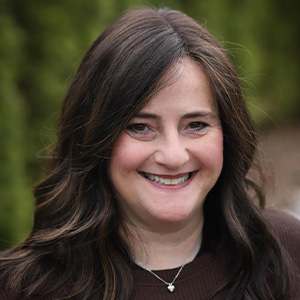“Seminary Classes Scared Me Off from Dating”

After all I've learned about red flags, please remind me why I would want to get married

Two years ago I went off to seminary, bright-eyed and bushy-tailed, eager to absorb the wisdom of my teachers and mechanchos. I loved my school, I adored Eretz Yisrael, and I took it all in hungrily. The hashkafah classes were amazing, and I particularly loved the lessons about building a Torahdig home. It was uplifting and inspiring... until it wasn’t. After Pesach, our teachers began giving Toras Habayis classes about marriage, relationships, and child-rearing, etc. They let us know that it was important to be realistic and not to think that marriage was all peaches and cream. They drilled into us that marriage is hard work and a real laboratory for working on our middos. And finally, they went through the potential dangers of marriage, spending a lot of time on red flags and warning signs.
I really appreciated their concern, but honestly, they completely freaked me out. By the time I came home, I was dreading marriage and terrified to date. Two years have passed since then and while many friends have gone on to marry happily (as far as I know), several have also suffered broken engagements, and there have even been two divorces from my seminary class. I’m afraid to date. And I’m even more afraid to get married.
Please remind me why I would want to get married. And please share any advice you might have for pushing past the fear.
Scared of Marriage
Dear Scared of Marriage,
Thank you for this question. I appreciate hearing this perspective, as will many mechanchos and teachers. Whenever the pendulum swings too far, we need forces, such as this letter, to bring us back to the center.
Much progress has been made in lifting our communal blinders. It took great siyata d’Shmaya, courage, and vision to break the walls of silence that were erected around topics like domestic violence, controlling spouses, and other unhealthy relationship patterns. Magazine articles, kallah teacher training, and curriculum additions in high school and seminary all contributed toward educating the public about the potential dangers of marrying an unhealthy person. What a chesed!
Did it go overboard?
That’s a tough question. We can’t quantify the value of saving someone from a destructive marriage. We can, however, agree that there was collateral damage and your letter highlights where it played out.
How do we restore balance? I guess the same way we bring balance to every part of life, because in essence, every part of life is potentially scary. Crossing the street can be risky, eating can be dangerous, driving a car can be life-threatening. Living implies risk. And, ultimately, we are mandated to do two things simultaneously: to behave responsibly with appropriate caution and trust implicitly in Hashem.
Part of behaving responsibly includes educating ourselves on what emotional healthiness and unhealthiness looks like in a partner. It includes seeking guidance from parents and wise mentors about what certain behaviors represent. It includes dating long enough to see if niggling feelings develop into full-blown worries. It may include doing research and subsequent research if we see red flags.
And then when all of that has been done in a thorough, yet healthy way, if everything seems clear, we must let go and trust Hashem. For what I’ve learned is that when it comes to shidduchim, we hear what we’re meant to hear, and we don’t hear what we’re not meant to hear. How many people who have survived controlling marriages were shocked because, “Everyone said he was such a nice guy”? While it may seem cliché to say, “Do your hishtadlus and then have bitachon,” the fact is, this is the ultimate comfort. Knowing that Hashem runs the world and that He only expects us to do our very best is actually the only thought that can hold us.
Now, this is pretty generic advice for all the women in your cohort who may have been exposed to this preventative education. I would like to direct my next comments to you specifically. My guess is that many of the young ladies who attended these classes found them interesting and tucked the information away in their heads for some future reference. It seems these warnings impacted you in a profound way, to the point that they actually made you wary of dating and maybe even of men.
When something hits so deeply, we often have to ask: What nerve is it touching? Are you fearful by nature? Do you struggle with anxiety or with decision-making in general and did this just take you beyond your threshold of tolerance? Have you witnessed difficult marriages in your close sphere?
Everyone will react to the same stimulus differently, based on whatever previous experiences they bring to the table. I urge you to look within, either by yourself or with a trusted adult or therapist, and explore whether you have some undiscovered fears about marriage that were ignited by some of these classes. It will be a gift to you and to your upcoming marriage, im yirtzeh Hashem, to shed some light on those feelings and heal them before you enter the next phase of your life.
A healthy marriage is one of Hashem’s greatest gifts to mankind. “Lo tov heyos ha’adam levado.” We’re not meant to live alone, to traverse this earth by ourselves. We’re meant to share life, to grow together, to struggle together, to laugh together, to build together. When a couple joins in peace and friendship, it’s a sublime experience that can’t be replicated in any other relationship. Love is the end goal of all life, and marriage is our greatest means to achieve it. When you want it more than you fear it, that’s when you’ll be able to push past the fear.
May we all be zocheh to meet life, at every stage, with a healthy mix of responsible hishtadlus and a heavy dose of bitachon.
All the best,
Sara
Sara Eisemann, LMSW, ACSW, is a licensed social worker and a dating mentor. She lectures on topics related to relationships, personal development, authenticity, and growth. She welcomes questions, comments, feedback, and interaction at matchquest@mishpacha.com.
(Originally featured in Family First, Issue 827)
Oops! We could not locate your form.


